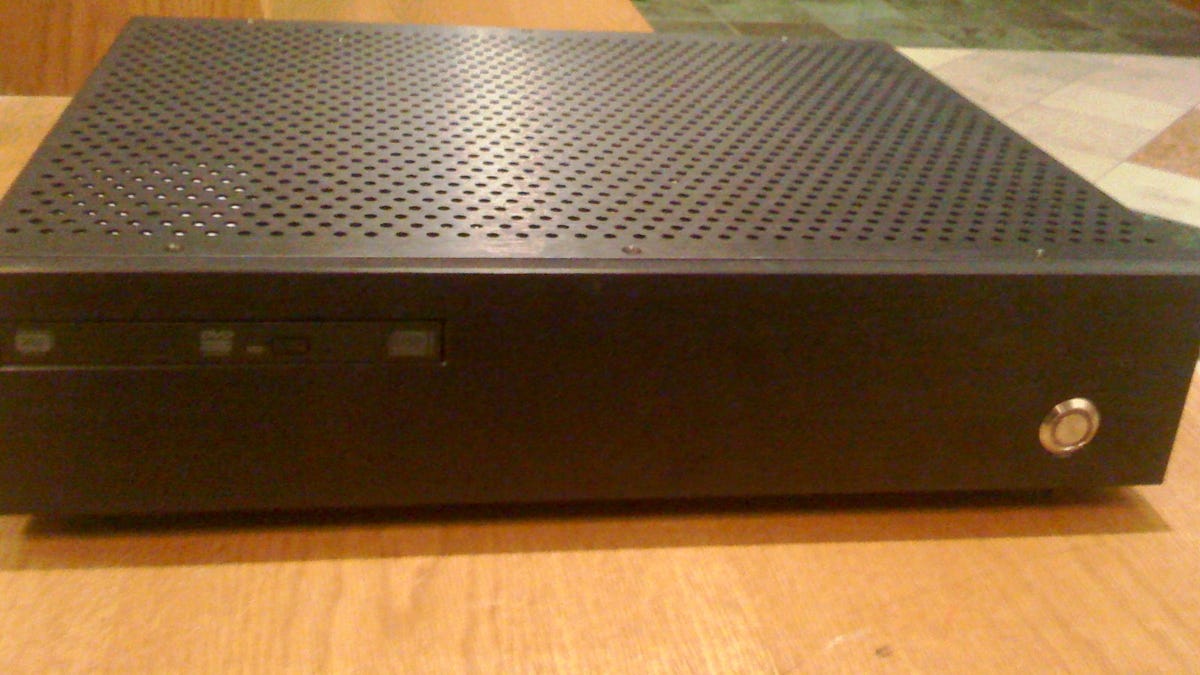Is RealDVD dispute really about a DVD jukebox?
CNET snaps photos of RealNetworks' "Facet," a prototype DVD player that copies and stores hundreds of films. Is this the real reason Hollywood sued Real?

SAN FRANCISCO--When it comes to RealNetworks' strategy to offer consumers a digital alternative to movie discs, RealDVD is only one facet.
"Facet" is also the codename for Real's prototype DVD player. The box, which Real CEO Rob Glaser demonstrated in court on Tuesday, comes equipped with a hard drive and software that enables owners to duplicate DVDs--in a similar fashion as RealDVD--and then store hundreds of movies on the device.
Glaser testified in U.S. District Court here during a preliminary hearing in the copyright case against RealDVD. The Motion Picture Association of America has alleged in a lawsuit that RealDVD, which enables people to copy a DVD and store it on a PC, violates copyright law. What became evident during Tuesday's proceedings is that Facet may be much more important to Real than RealDVD.
Facet "strikes me as much more promising market for Real than ripping on personal computers," said Fred von Lohmann, who was in court to observe and who is senior attorney for the Electronic Frontier Foundation, which advocates for Internet users and technology companies. "Where PCs are involved, Real has to compete against software readily available on the Web, such as HandBrake, which promises more features for less money."
TiVo for DVDs
Real began work on Facet with the hope of building a next-generation DVD player, Glaser told before U.S. District Judge Marilyn Patel. Glaser argued that consumers are clamoring for a better way to manage their DVD collections and that Facet and similar products, such as high-end DVD players from Kaleidescape, do exactly that. In addition to building its own box, Real could conceivably generate income by licensing Facet's software to consumer electronic makers.
The major film studios perhaps view Facet as a device that could do to DVDs what the iPod did to recorded music. Facet owners could rent or borrow films and then copy and store them without ever having to pay a cent. It's been widely reported that most of the music on iPods was ripped from CDs or illegally downloaded.
The studios maintain that consumers don't have the right to copy films they already own, according to statements made by MPAA lawyers during the hearing, which started Friday and will continue Wednesday. Hollywood contends that if, for example, consumers want to download a copy of a movie they already own, then they must pay additional fees for the digital version.
If Real wins the case, it would open the door for others to create devices without having to first seek studio approval. EFF's von Lohmann has long accused the MPAA, which he says has a long anti-innovation history going back to the Sony Betamax, of targeting RealDVD to preserve its business models rather than to protect movies from piracy.
During Glaser's demonstration of Facet, he showed how the box made the process of scanning, selecting, and pulling up digital DVD copies as simple as managing an iTunes music library.
In addition, the box could instantly provide a synopsis about a film or the movie's cover art, as well as enable a user who interrupts the playback for whatever reason to instantly return to the spot where the movie left off. Glaser used a copy of a box set from the show "The Sopranos" to demonstrate how a Facet owner could begin playing any episode within the set almost instantly.
A Facet owner wouldn't have to worry about digging into a drawer or cupboard for a disc, loading it into a DVD player, and waiting for the DVD drive to begin spinning. The box is like a TiVo for DVDs, said von Lohmann.
When it comes to offering copy protection, Facet locks down information far more effectively than RealDVD. Glaser said movies copied by the device would only play on that machine.
Kaleidescape was Real's blueprint
Glaser credited a DVD-copying device from Kaleidescape, which cost about $10,000, as Real's main inspiration. First, Glaser fell in love with his Kaleidescape while his wife was pregnant and bedridden. During this period, the couple watched a lot of movies and he said the box "liberated us from DVDs."
Glaser told the court this is when he began thinking about making a less expensive, mainstream version.
"Kaleidescapes are like Porsches," Glaser said. "They're very expensive. We thought we could develop Chevys, a $300 product that could replace a person's DVD player."
The second area where Kaleidescape influenced Real was by winning a legal challenge brought by the DVD Copy Control Association, which administers CSS encryption, the technology that protects DVDs from unauthorized copying.
The DVD CCA sued Kaleidescape, a CSS licensee, for breach of contract specifically over the CSS license requirements that physical DVDs be present in devices during playback.
Glaser said the decision opened the door legally and prompted Real to go to work on a similar product.
At that point in Glaser's testimony, he appeared to attempt to drive the point home that the MPAA's lawsuit was a thinly cloaked attempt to quash competition. He told the court that Hollywood is working hard to sell digital film copies that it bundles with DVDs but also charges more for the added copy. He said that unless the restraining order placed on RealDVD last fall is removed soon--a move that would presumably allow Real to begin selling that software as well as the Facet--the film industry would effectively kill Real's attempts to offer consumers a better way to watch movies.
"If we're enjoined (from selling RealDVD)," Glaser testified, "it would have very dire consequences frankly for us to ever be in this business."

